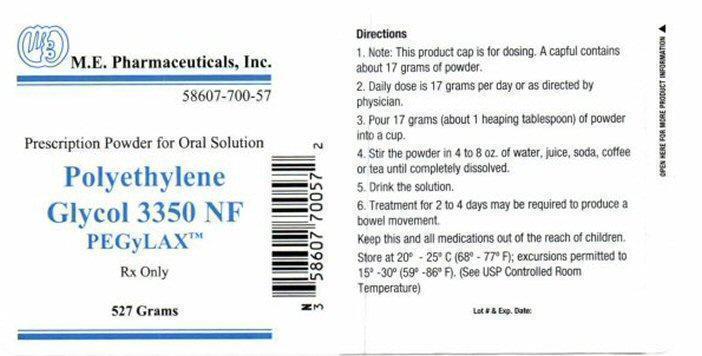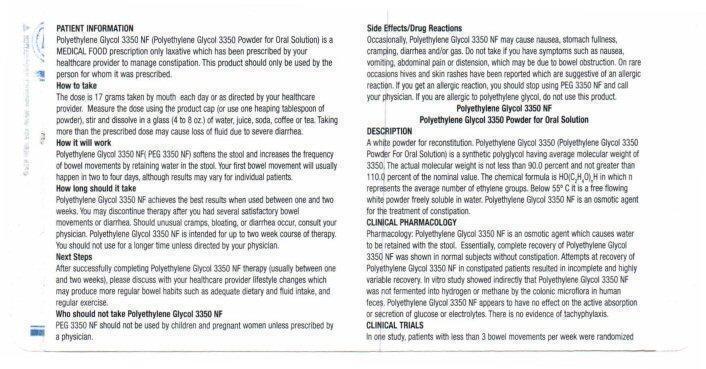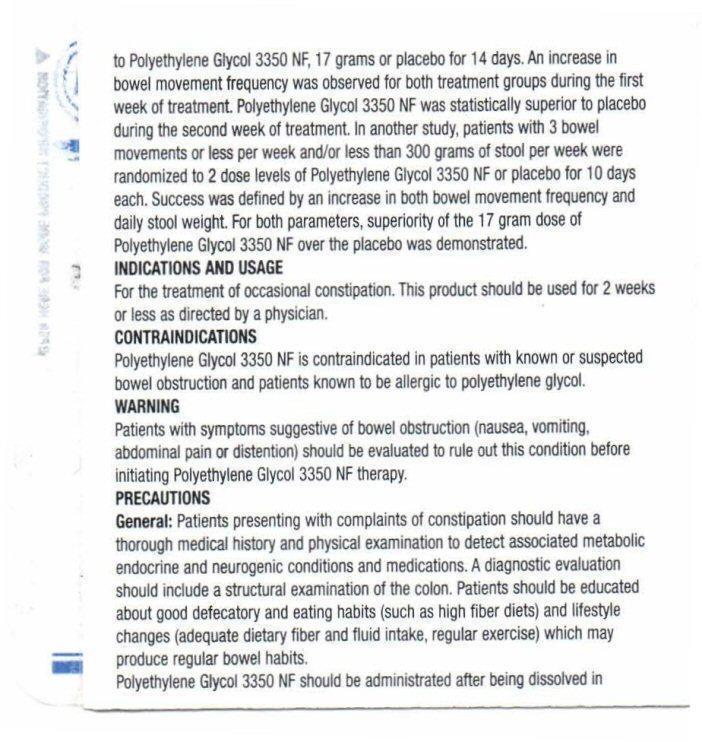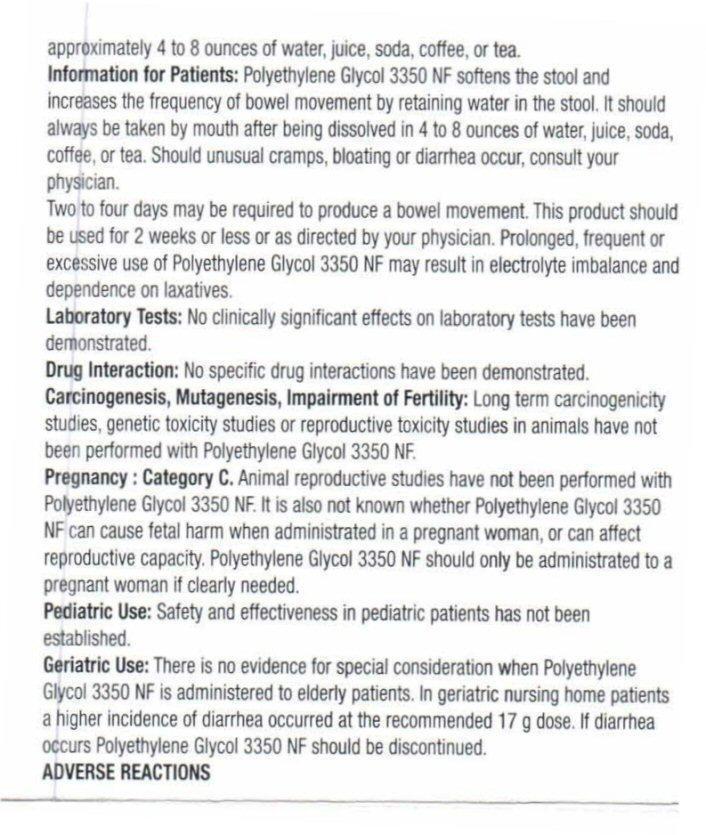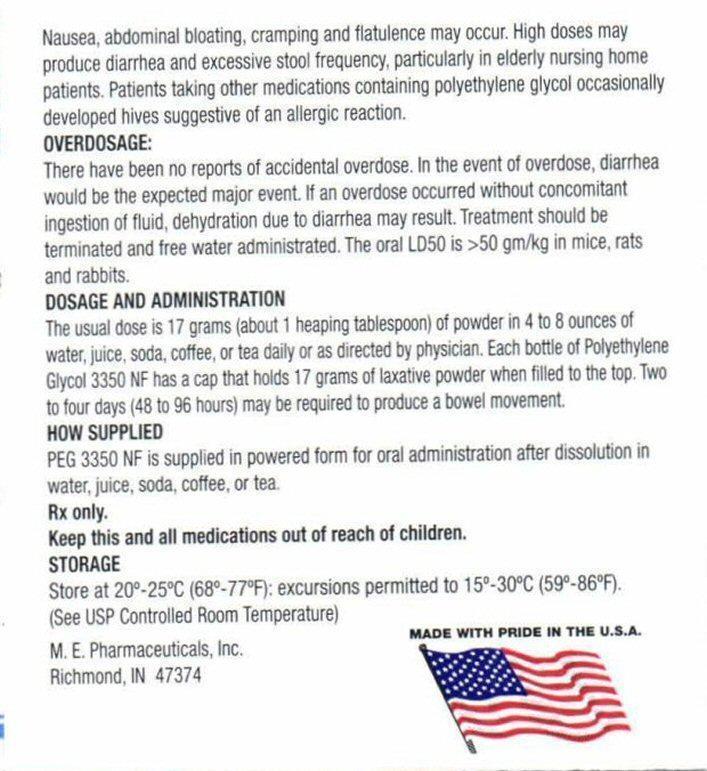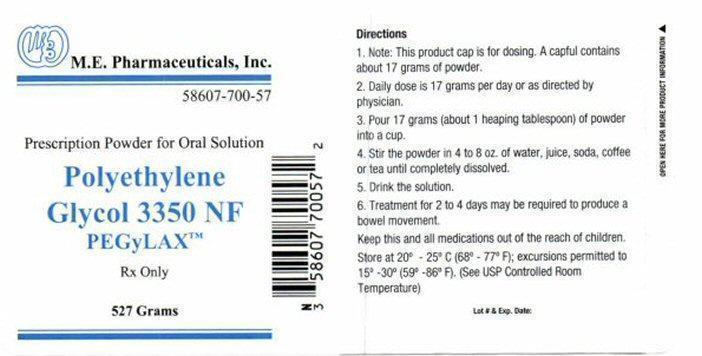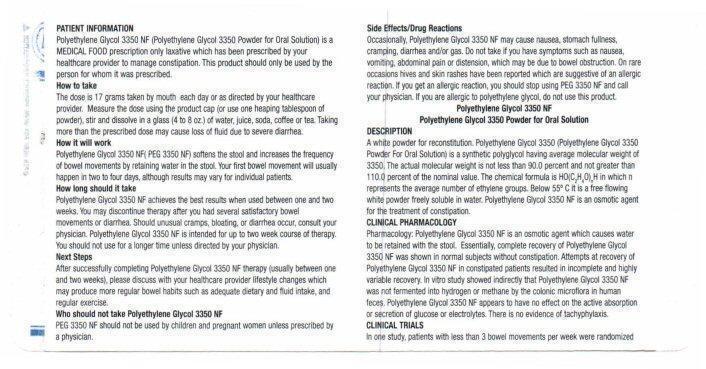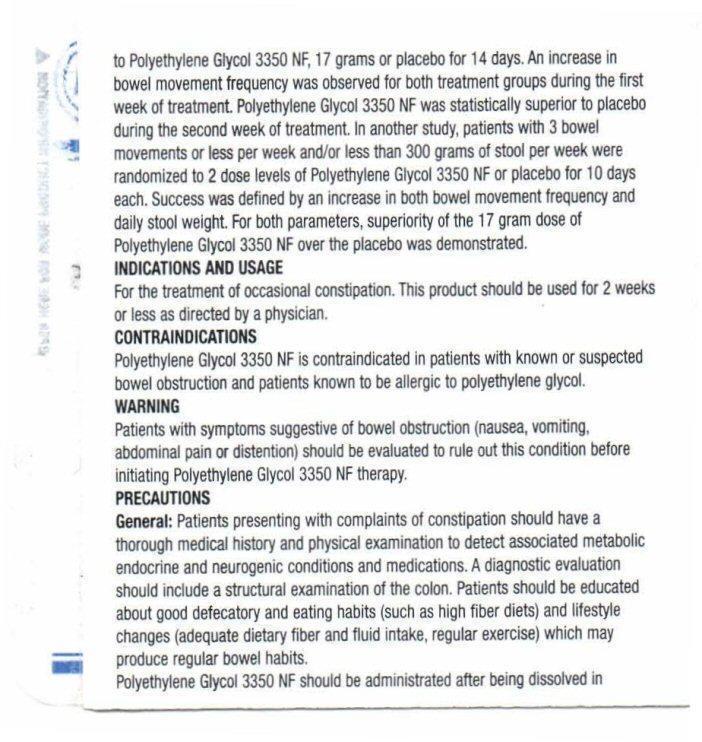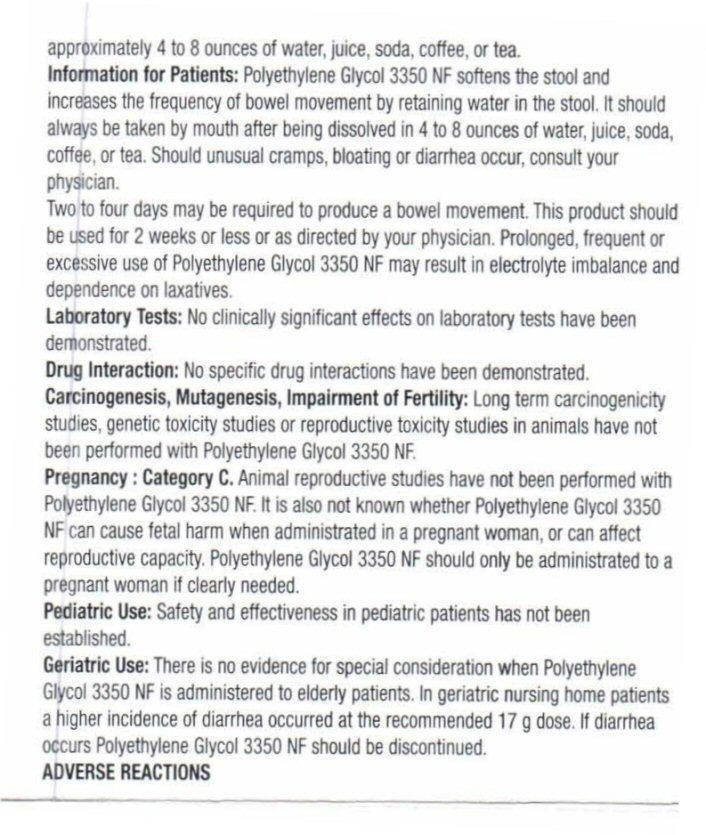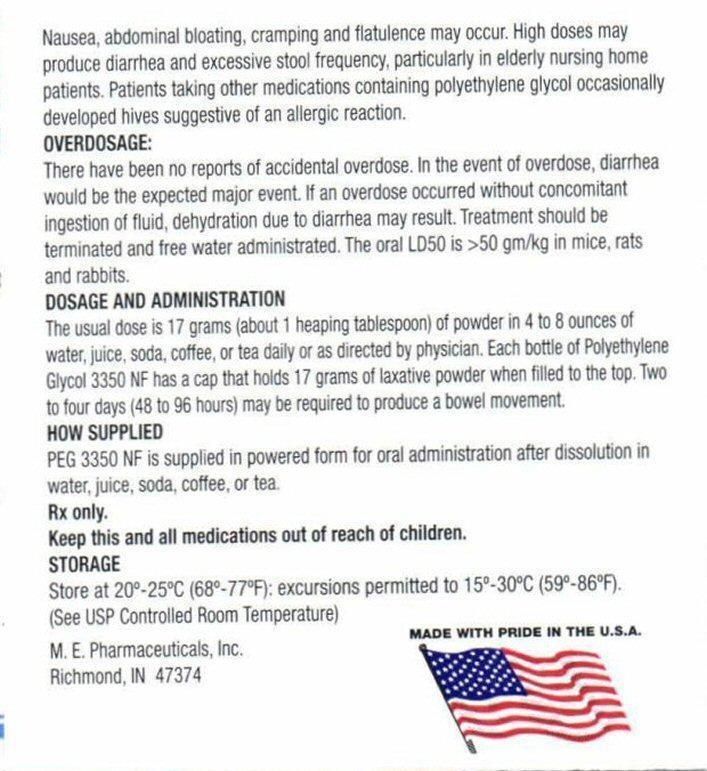Label: POLYETHYLENE GLYCOL 3350 NF PEGYLAX- polyethylene glycol 3350 powder, for solution
-
Contains inactivated NDC Code(s)
NDC Code(s): 58607-700-57 - Packager: MARTIN EKWEALOR PHARMACEUTICALS, INC.
- Category: HUMAN PRESCRIPTION DRUG LABEL
- DEA Schedule: None
- Marketing Status: unapproved drug other
DISCLAIMER: This drug has not been found by FDA to be safe and effective, and this labeling has not been approved by FDA. For further information about unapproved drugs, click here.
Drug Label Information
Updated December 13, 2013
If you are a consumer or patient please visit this version.
- Download DRUG LABEL INFO: PDF XML
- Official Label (Printer Friendly)
-
Directions
1. Note: This product cap is for dosing. A capful contains about 17 grams of powder.
2. Daily dose is 17 grams per day or as directed by physician.
3. pour 17 grams (about 1 heaping tablespoon) of powder into a cup.
4. Stir the powder in 4 to 8 oz. of water, juice, soda, coffee or tea until completely dissolved.
5. Drink the solution.
6. Treatment for 2 to 4 days may required to produce a bowel movement.
Keep this and all medications out of the reach of children.
Store at 20° - 25° C (68° - 77° F); excursions permitted to 15° - 30°(59° - 86° F). (See USP Controlled Room Temperature)
Lot # and Exp. Date:
Open here for more product information -
PATIENT INFORMATION
Polyethylene Glycol 3350 NF (Polyethylene Glycol 3350 Powder for Oral Solution) is a MEDICAL FOOD prescription only laxative which has been prescribed by your healthcare provider to manage constipation. This product should only be used by the person for whom it was prescribed.
How to take
The dose is 17 grams taken by mouth each day or as directed by your healthcare provider. Measure the dose using the product cap (or use one heaping tablespoon of powder), stir and dissolve in a glass (4 to 8 oz.) of water, juice, soda, coffee, or tea. Taking more than the prescribed dose may cause loss of fluid due to severe diarrhea.
How it will work
Polyethylene Glycol 3350 NF(PEG 3350)NF) softens the stool and increases the frequency of bowel movements by retaining water in the stool. Your first bowel movement will usually happen in two to four days, although results may vary for individual patients.
How long should it take
Polyethylene Glycol 3350 NF achieves the best results when used between one and two weeks. You may discontinue therapy after you have had several satisfactory bowel movements or diarrhea. Should unusual cramps, bloating, or diarrhea occur, consult your physician. Polyethylene Glycol 3350 NF is intended for up to a two week course of therapy. You should not use for a longer time unless directed by your physician.
Next Steps
After successfully completing Polyethylene Glycol 3350 NF therapy (usually between one and two weeks,) please discuss with your healthcare provider lifestyle changes which may produce more regular bowel habits such as adequate dietary and fluid intake, and regular exercise.
Who should not take Polyethylene Glycol 3350 NF
PEG 3350 NF should not be used by children and pregnant women unless prescribed by a physician.
Side Effects/Drug Reactions
Occasionally, Polyethylene Glycol 3350 NF may cause nausea, stomach fullness, cramping, diarrhea and /or gas. Do not take if you have symptoms such as nausea, vomiting, abdominal pain or distension, which may be due to bowel obstruction. On a rare occasions hives and skin rashes have been reported which are suggestive of an allergic reaction. If you get an allergic reaction reaction, you should stop using PEG 3350 NF, and call your physician. if you are allergic to polyethylene glycol, do not use this product. -
Polyethylene Glycol 3350 NF
Polyethylene Glycol 3350 Powder for Oral Solution
A white powder for reconstitution. Polyethylene Glycol 3350 (Polyethylene Glycol 3350 Powder For Oral Solution) is a synthetic polyglycol having an average molecular weight of 3350. The actual molecular weight is not less than 90.0 percent and not greater than 110.0 percent of the normal value. The chemical formula is HO(C2H4O)nH in which n represents the average number of ethylene groups. Below 55° it is a free flowing white powder freely soluble in water. Polyethylene Glycol 3350 NF is an osmotic agent for the treatment of constipation.
-
CLINICAL PHARMACOLOGY
Pharmacology: Polyethylene Glycol 3350 NF is an osmotic agent which causes water to be retained with the stool. Essentially, complete recovery of Polyethylene Glycol 3350 NF was shown in normal subjects without constipation. Attempts at recovery of Polyethylene Glycol 3350 NF in constipated patients resulted in incomplete and highly variable recovery. In vitro study showed indirectly that Polyethylene Glycol 3350 NF was not fermented into hydrogen or methane by the colonic mircoflora in human feces. Polyethylene Glycol 3355 NF appears to have no effect on the active absorption or secretion of glucose or electrolytes. There is no evidence of tachyphylaxis.
-
CLINICAL TRIALS
In one study, patients with less than 3 bowel movements per week were randomized to Polyethylene Glycol 3350 NF, 17 grams or placebo for 14 days. An increase in bowel movement frequency was observed for both treatment groups during the first week of treatment. Polyethylene Glycol 3350 NF was statistically superior to placebo during the second week of treatment. In another study, patients with 3 bowel movements or less per week and/or less than 300 grams of stool per week were randomized to 2 dose levels of Polyethylene Glycol 3350 NF or placebo for 10 days each. Success was defined by an increase in both bowel movement frequency and daily stool weight. For both parameters, superiority of the 17 gram dose of Polyethylene Glycol 3350 NF over the placebo was demonstrated.
- INDICATIONS AND USAGE
- CONTRAINDICATIONS
- WARNINGS
-
PRECAUTIONS
General: Patients presenting with complaints of constipation should have a thorough medical history and physical examination to detect associated metabolic endocrine and neurogenic conditions and medications. A diagnostic evaluation should include a structural examination of the colon. Patients should be educated about a good defecatory and eating habits (such as high fiber diets) and lifestyle changes (adequate dietary fiber and fluid intake, regular exercise) which may produce regular bowel habits.
Polyethylene Glycol 3350 NF should be administered after being dissolved in approximately 4 to 8 ounces of water, juice, soda, coffee,or tea.
Information for Patients: Polyethylene Glycol 3350 NF softens stool and increases the frequency of bowel movement by retaining water in the stool. It should always be taken by mouth after being dissolved in 4 to 8 ounces of water, juice, soda, coffee or tea. Should unusual cramps, bloating or diarrhea occur, consult your physician.
Two to four days may be required to produce a bowel movement. This product should be used for 2 weeks or less or as directed by your physician. prolonged, frequent or excessive use of Polyethylene Glyycol 3350 NF may result in electrolyte imbalance and dependency on laxatives.
Laboratory Tests: No clinically significant effects on laboratory tests have been demonstrated.
Drug Interaction: No specific drug interactions have been demonstrated.
Carcinogenesis, Mutagenesis, Impairment of Fertility: Long term carcinogenicity studies, genetic toxicity studies or reproductive toxicity studies in animals have not been performed with Polyethylene Glycol 3350 NF.
Pregnancy: Category C. Animal reproductive studies have not been performed with Polyethylene Glycol 3350 NF. It is not known wheter Polyethylene Glycol 3350 NF can cause fetal harm when administered in a pregnant woman, or can affect reproductive capacity. Polyethylene Glycol 3350 NF should only be administered to a pregnant woman if clearly needed.
Pediatric Use: Safety and effectiveness in pediatric patients has not been established.
Geriatric Use: There is no evidence for special consideration when Polyethylene Glycol 3350 NF is administered to elderly patients. In geriatric nursing home patients a higher incidence of diarrhea occurred at the recommended 17 g dose. If diarrhea occurs Polyethylene Glycol 3350 NF should be discontinued.. -
ADVERSE REACTIONS
Nausea, abdominal bloating, cramping and flatulence may occur. High doses may produce diarrhea and excessive stool frequency, particularly in elderly nursing home patients. Patients taking other medications containing polyethylene glycol occasionally developed hives suggestive of an allergic reaction.
-
OVERDOSE
There have been no reports of accidental overdose. In the event of overdose, diarrhea would be the expected major event. If an overdose occurred without conomitant ingestion of fluids, dehydration due to diarrhea may result. Treatment should be terminated and free water administered. The oral LD50 is >50g/kg in mice, rats and rabbits.
-
DOSAGE AND ADMINISTRATION
The usual dose is 17 grams (about 1 heaping tablespoon) of powder in 4 to 8 ounces of water, juice, soda, coffee or tea daily or as directed by physician. Each bottle of Polyethylene Glycol 3350 NF has a cap that holds 17 grams of laxative powder when filled to the top.Two to four days (48 to 96 hours0 may be required to produce a bowel movement.
- HOW SUPPLIED
- Keep this and all medication out of the reach of children.
- STORAGE
- Product Label Product Insert
-
INGREDIENTS AND APPEARANCE
POLYETHYLENE GLYCOL 3350 NF PEGYLAX
polyethylene glycol 3350 powder, for solutionProduct Information Product Type HUMAN PRESCRIPTION DRUG Item Code (Source) NDC:58607-700 Route of Administration ORAL Active Ingredient/Active Moiety Ingredient Name Basis of Strength Strength POLYETHYLENE GLYCOL 3350 (UNII: G2M7P15E5P) (POLYETHYLENE GLYCOL 3350 - UNII:G2M7P15E5P) POLYETHYLENE GLYCOL 3350 17 g in 17 g Packaging # Item Code Package Description Marketing Start Date Marketing End Date 1 NDC:58607-700-57 527 g in 1 BOTTLE Marketing Information Marketing Category Application Number or Monograph Citation Marketing Start Date Marketing End Date unapproved drug other 12/16/2013 Labeler - MARTIN EKWEALOR PHARMACEUTICALS, INC. (624528386) Registrant - MARTIN EKWEALOR PHARMACEUTICALS, INC. (624528386) Establishment Name Address ID/FEI Business Operations MARTIN EKWEALOR PHARMACEUTICALS, INC. 624528386 manufacture(58607-700)

